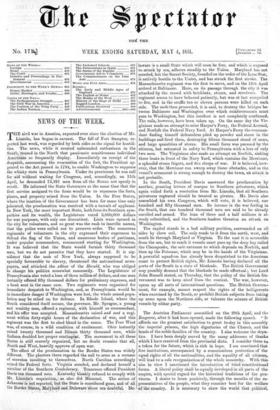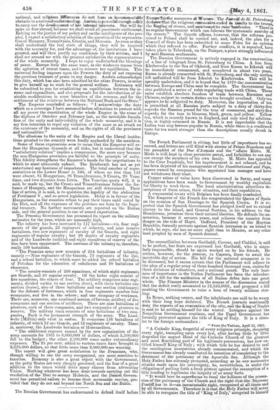national, and religious differences do not form an insurmountable obstacle
to a national understanding. Austria is-powerful enough safely to carry out the development of her internal interests. She will in- spire no fear abroad; because we shall avoid all 'passionate excitement. Relying on the justice of my policy and on the intelligence of the pee-. pies, I expect a satisfactory solution of the question of the representa- tion of Hungary, Transylvania, Croatia, and Slavonia. As soon as.they shall understand the real state of things, they will be inspired with the necessity for, and the advantage of, the institutions I have granted, and will then justify my confidence by their actions, and I shall see around me with the greatest satisfaction the representatives of the whole monarchy. I hope to enjoy undisturbed the blessings of peace. Europe feels the same want, as she wishes to repose from the agitation of recent times, and to recover her equilibrium. This universal feeling imposes upon the Powers the duty of net exposing the precious treasure of peace to any danger. Austria acknowledges this duty, which has also been admitted by the other Powers, in order to give herself up to work for the general welfare. Estimates will be submitted to you for establishing an equilibrium between the in- come and expenditure, and also proposals for the introduction of de- sirable modifications in some branches of the revenue, and for the settlement of the relations between the National Bank and theState."
The Emperor contluded as -follows : "I acknowledge the duty which as a sovereign I have assumed before all nations to protect with all my power the constitution of the whole Empire in the sense of the diploma of October and February last, as the inviolable founda- tion of the unity and indivisibility of the whole monarchy, and it is my firm intention to repel any violation of the same as an attack on the existence of the monarchy, and on the rights of all the provinces and nationalities."
The allusions to the unity of the Empire and the liberal institu- tions granted to the country were loudly applauded by the members. Some of these expressions seem to mean that thelmperor will re- fuse the Hungarian demands at all risks, but is understood that the "satisfactory solution" implies a compromise, the more easy 'because the non-Hungarian provinces are faithful to the principle of unity. This fidelity strengthens the Emperor's hands for the negotiations to which he must ultimately submit. The Reiehsrath has not as yet entertained any business of importance. The total number of repre- sentatives in the Lower House is 340, of whom no less than 112 were absent, 85 Hungarians, 26 Transylvanians, 9 Croats, 20 Vene- tians, and two deputies from Istria. The Venetian quota will, it is said, be made up, but the Croats and Transylvanians follow the for- tunes of Hungary, and the Hungarians are still determined. Their line of action, it is said, is to question the le ty of th of Ferdinand V., and so arrest legislation. legality favour lay is in favo of the in e abdication Hungarians, as the counties refuse to pay their taxes until voted by the Diet, and all the expenses of the province are born by the Impe- rial treasury. No further movements are reported on the Italian side, and the general position is one of armed expectation. The Prussian Government has presented its report on the military estimates for the year, which are unusually high. The infantry has been increased by 117 battalions—viz, four regi- merits of the guards, 32 regiments of infantry, and nine reserve battalions, two new regiments of cavalry of the Guards, and eight regiments of regular cavalry ; but 20 depots of cavalry regiments and of the Landwehr (militia) and eight squadrons of reserve of the lime have been suppressed. The increase of the infantry is, therefore, really 109 battalions. "The Prussian army now consists of 254 battalions of infantry, namely :—Nine regiments of the Guards, 72 regiments of the line, and a school battalion, to which mast be added the school battalion of Potsdam for the education of subalterns and 10 battalions of chasseurs.
"The cavalry consists of 200 squadrons, of which eight regiments are Guards, ana 40 regular cavalry. Of the latter eight consist of five squadrons, the others of four. The artillery comprises nine regi- ments, divided eachin to one section (foot), with three batteries one section (horse), also of three battalions and one section (stationary) for the defence of fortresses, which in four regiments number four companies, and five in the others; and one company of workmen. There are, moreover, one combined section of fortress artillery of five companies and one section of artificers. There are nine battalions of pioneers, each of three companies, and-two companies of pioneers in reserve. The military train consists of nine battalions of two com- panies Such is the permanent strength of the army. The Land- (Istilitia) only exist in -cadres. It comprises 116 battalions of infantry, of which 12 are Guards, and 12 regiments of cavalry. There is, moreover, the Landwehr battalion of Hohenzollern.
"The additional expense caused by the new organization of the army amounts for 1861 to 6,000,000 of dollars, of which 3,500,000 fall to thebudget ; the other 2;500,000 come under extraordinary expenses. The 25 per cent, added to various taxes have 'brought in 3,670,000 dollars, so that little more than 2,000,000 are wanting.
The report will give -great satisfaction to the Prussians, who, though willing to see the army reorganized, are most sensitive to taxation. Economy is also a great object with the Government, as the petty States are very oheaply governed, and the fear of a great addition to the taxes would deter many classes from advocating Union. 'Nothing-whatever has been done towards carrying out the resolution of the 'Diet to occupy Holstein, and the Danish Govern- ment has permitted sailors to resume their mercantile marine, pro- vided that they do not sail beyond the North Sea and the Baltic.































